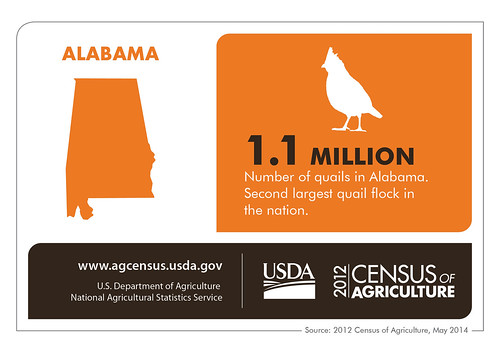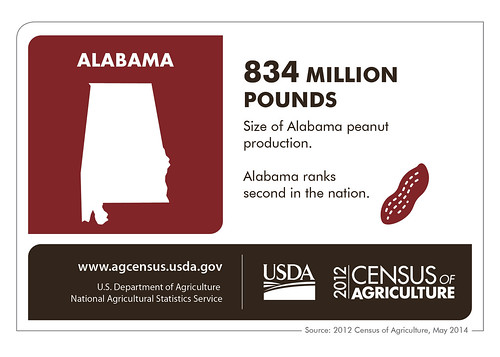
The Census of Agriculture is the most complete account of U.S. farms and ranches and the people who operate them. Every Thursday USDA’s National Agricultural Statistics Service will highlight new Census data and the power of the information to shape the future of American agriculture.
Alabama may be known as the Cotton state, but there’s a lot more to our agriculture than cotton, a point reinforced by the data in the most recent Census of Agriculture. While more than 376,000 acres of nearly nine million acres of farmland in the state are dedicated to cotton farming, there are now more farms growing corn (2,112 farms) and soybeans (1,502 farms) in Alabama than those growing cotton (925 farms).
All in all, it was great to see how well our farming is doing, especially considering that in 2012 we saw one of the worst droughts in history. More than 90 percent of Alabama was affected by the drought that year. Despite these tricky conditions, our farmers sold more than $5.5 billion worth of agricultural products in 2012, a 26 percent increase from the previous census, taken in 2007.
It is livestock, however, rather than crop farms, which dominate our agriculture today. In 2012, livestock farms had nearly $4.3 billion in sales, accounting for more than three-fourths of all of the agricultural sales in Alabama. In 2012, we had nearly 173 million broiler-type chickens, putting us in second place behind Georgia. Our laying hens more than 1.8 billion eggs that year. Alabama producers can also boast the second-largest quail flock in the nation. As of 2012, with more than 1.1 million in 2012.
In addition to these sectors, Alabama also has a very strong aquaculture presence. According to the census, our farmers raised more than $112 million in catfish and nearly $2.7 million in sport or game fish in 2012.
Alabama farms are also diversifying their practices. In 2012, more than 2,000 farms produced and sold value-added products, including products such as beef jerky, fruit jams, jelly, wine, etc. One hundred eighty four of Alabama farms participated in community-supported agriculture programs that year. And more than 500 farms marketed their products directly to retail outlets.
These are just some of the more exciting facts about Alabama agriculture, however. For more data on our state’s production, check out our complete 2012 Census.

